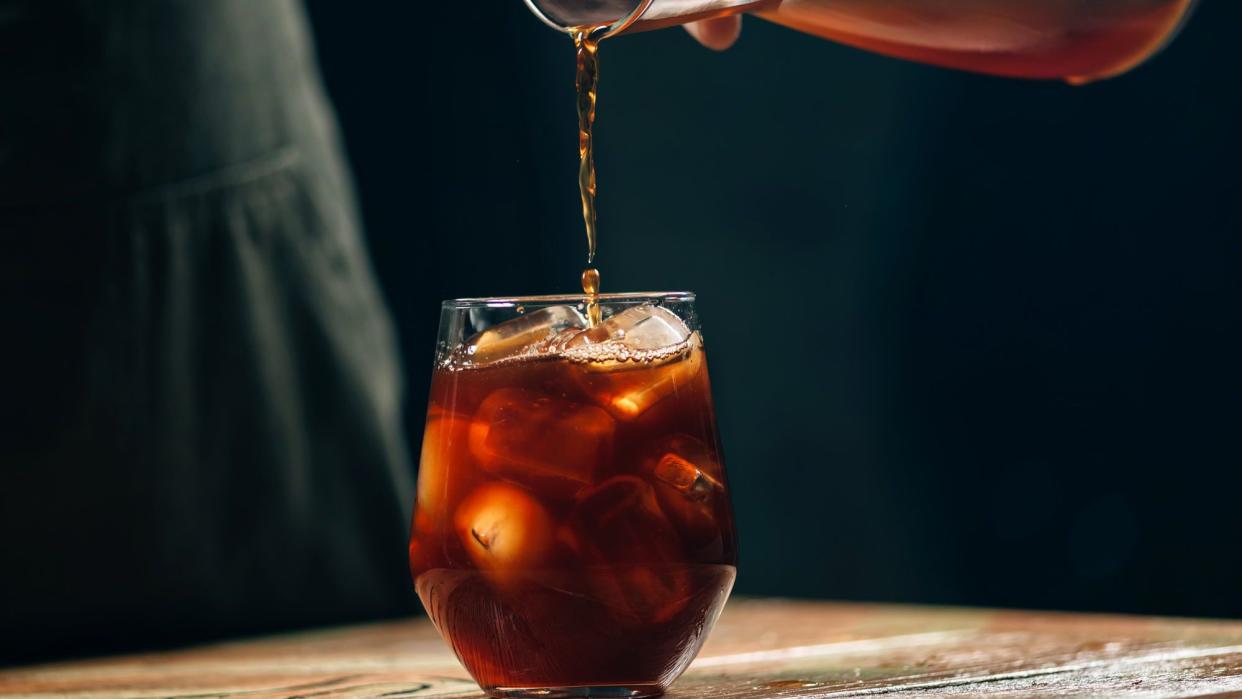Cold Brew and Iced Coffee Are Not the Same Thing

Getty Images
What Is Cold Brew and How Is It Different from Iced Coffee?
Writer, coffee expert, and founder of Boss Barista Ashley Rodriguez explains that the simplest definition of cold brew is in the name itself. "Cold brew is coffee, brewed cold! Instead of using hot water to pull out flavor from ground coffee, you use cold water, which means the process takes a lot longer –– usually 12 to 24 hours." The coffee beans are coarsely ground and there are various vessels that you can use for steeping, from a small pitcher or jar with a filter to a large industrial container.
Traditional iced coffee is coffee that's brewed hot and then served over ice, though many coffee shops use the terms cold brew and iced coffee interchangeably, which can be confusing for customers who actually prefer one or the other. Rodriguez says the lack of heat in the brewing process really affects the flavor of cold brew, since hot water typically helps extract flavor from the coffee grounds. "In general –– and this is not a hard and fast rule –– cold brew tends to mute acidity, so the flavor is smooth and round, which can be enjoyable, but acidity is what gives many drinks complexity."
What's the Deal With Nitro Cold Brew?
Nitro cold brew is on the menu at coffee shops around the country, including Starbucks and Dunkin' –– you might even see it on tap at certain places, where the setup resembles a bar that serves draft beer. To give the drink a little carbonation, a smoother mouthfeel, and sometimes even a layer of foam, nitrogen is infused into the cold brew; the drink is often served without ice for a smoother experience, and it can look like a pint of Guinness. Rodriguez notes that nitrogen as a carbonation method is a nice way to give it that carbonated frothiness without changing the flavor. :If you've chosen to cold brew the coffee, you've already picked a brewing method that minimizes acidity," she says. "So it'd be weird to introduce another component that would add it back in."
How Much Caffeine Is In Cold Brew?
Cold brew concentrate (which is often diluted with either water or milk) is quite strong and highly caffeinated because of the higher ratio of grounds to water. The strength of cold brew varies widely from brand to brand, but bottled cold brew sold in grocery stores will often note the caffeine levels, serving size, and instructions for diluting on the label. But as Rodriguez points out: "Cold brew is sort of the wild west of coffee drinks because there's no designation of how you should dilute it." The strength of the brew really depends on how much water was used to make it, as well as how much water used to cut it. "In general, people tend to make cold brew with pretty tight coffee to water ratios, so that's why it can feel like cold brew is really 'strong,'" she adds. "At this point in time, we've gotten so used to rocket fuel-like cold brew that I think it's kind of hard to go backwards."
In a coffee shop setting, the best thing to do is ask the barista about how strong the cold brew is –– you can also dilute it yourself with additional milk or water if it's too intense for your liking. If you're making cold brew concentrate at home or using store bought concentrate, feel free to play with the dilution to get the right caffeine level. Rodriguez says people often use the same amount of coffee grounds for cold brew and drip coffee, but they use less water for cold brew, producing a more highly caffeinated concentrate (hot coffee is normally brewed at a 1:16 ratio). Cold brew is often sold in 16 oz. cups, which means you're drinking more coffee and naturally more caffeine. Meanwhile, cold brew concentrate lasts in the fridge for 7 to 10 days according to Stumptown Coffee, so you can make it (or buy it) once and have fuel for the week ahead.